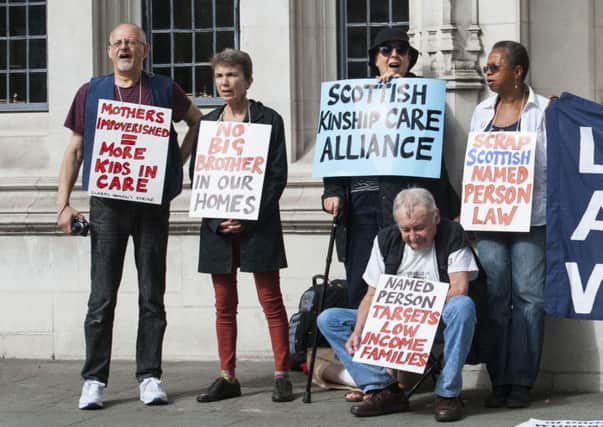Dani Garavelli: In denial over Named Person court ruling


On Twitter and elsewhere the question being asked most frequently was not: “Is this a positive outcome for the people of Scotland?” but: “How can we spin this ruling to inflict the greatest possible damage on our political rivals?” There were the sensationalist headlines from the usual suspects. “Named and shamed,” screamed the Mail; “Sturgeon kicked in teeth,” echoed the Express. And there were the brazen propagandists who insisted the SNP had been branded “totalitarian” – although the word appeared only once in a general explanation of the principles behind the UN Declaration of Human Rights, and the judges accepted the party’s intentions were “legitimate and benign”.
So many politicians were taking the moral high ground, it was getting claustrophobic up there. David Coburn claiming “a major victory for Ukip” we could all chuckle at wryly. But the Scottish Tories’ pitch for credit was more invidious. Welcoming the ruling – that sections of the Named Person legislation were incompatible with the European Convention on Human Rights (ECHR) – MSP Adam Tomkins praised his colleague Liz Smith MSP for “leading” the campaign. So what, exactly, was his party doing when the legislation was going through parliament in 2014? Was it offering a forensic dissection of its supposed flaws? Was it implacable in its opposition? Er, no. Its MSPs abstained and the Children and Young People (Scotland) Act (of which the Named Person is part) passed unopposed.
Advertisement
Hide AdAdvertisement
Hide AdThere is also irony in Ruth Davidson’s concerns over the “illiberality” of the policy at a time when Theresa May is pushing for new surveillance powers under the Investigatory Powers Bill. And even more in May’s previous complaints that the ECHR “binds the hands of parliament”.
Not that all the spinning was confined to one side. The SNP immediately accepted the ruling, promising to address the defects so it could press ahead with its policy as planned. But I suspect it may have underplayed the extent of the “tweaking” which will be required before it can be implemented. And an acknowledgement it should have got it right the first time round would not have gone amiss. However misleading the headline involved, was it really appropriate for the First Minister to launch a Twitter attack on a journalist on the day one of her flagship policies was found wanting? Wouldn’t some gesture of humility have been more becoming?
In his shrewd analysis of the Supreme Court judgment, lawyer and commentator Andrew Tickell suggested it was a Pyrrhic victory (for the Christian Institute and other challengers) and a Pyrrhic defeat (for the government). But what if you were more interested in its significance for the children, parents and frontline health and education workers most directly affected by the policy?
Well, the judgment cut through the “Orwellian plot” hyperbole and confirmed the overall legitimacy of a scheme, which is aimed at improving children’s well-being and safety and has been working effectively in other parts of the country, including the Highlands.
But by forcing the SNP to amend those sections that risk a breach of article 8 (which guarantees the right to respect for one’s family and private life) it also addressed concerns that the powers of the Named Person were too far-reaching. To be compliant, the judges said, the legislation must require the Named Person to emphasise the voluntary nature of the advice and support they offer. The threshold for sharing confidential material must be raised and the NP must have clearer guidance on proportionality – the factors that must be weighed when deciding whether or not it is appropriate to share such information without consent.
The SNP’s redraft will lead to greater clarity for those taking on the role of named person and greater safeguards for families, as well as making it more difficult to overturn. You could – if you were a glass half-full type of person – say this was the best of all possible outcomes.
My own take would be less Panglossian; it shouldn’t require privately funded court challenges to produce good law. The SNP’s failure to redraft the legislation earlier may (as opponents of the Offensive Behaviour at Football Act believe) be indicative of a general sloppiness which needs addressed. More broadly, the Supreme Court judgment underlines the risks of a unicameral chamber and/or the need for a strong and rigorous committee system.
There is, too, little to celebrate about the way the way the pro and anti-campaigns have been conducted. The SNP has been guilty of failing to communicate the advantages of the scheme and the NO2NP of exploiting that failure to create a climate of hysteria. Depending on your perspective, its overblown rhetoric of state snooperdom either drowned out more measured criticisms, or provided cover for the Scottish Government to ignore them. Either way, the depiction of Named Persons as state-sanctioned busybodies made life more difficult for those taking on the role.
Advertisement
Hide AdAdvertisement
Hide AdGiven the scale of the damage, you’d hope the Supreme Court ruling might usher in a period of calm and we could embark on a constructive assessment of outstanding logistical issues: for example, the ongoing problems over the recruitment of health visitors.
But there is little evidence of any such a detente. On Thursday, NO2NP spokesman Simon Calvert said he hoped the policy – which is already helping parents of children with special needs access vital services – would now “sink without trace”. Then Davidson accused Scottish education secretary John Swinney of “hubris” for agreeing to comply with the ruling, even as members of her party continued to misrepresent its conclusions.
For all their professed delight over the judgment, many right-wingers don’t want the legislation to be ECHR compliant, they want it to be scrapped; so – instead of working to help restore public confidence after the amendments are made – they will keep on peddling their “totalitarian” claptrap to anyone foolish enough to listen.